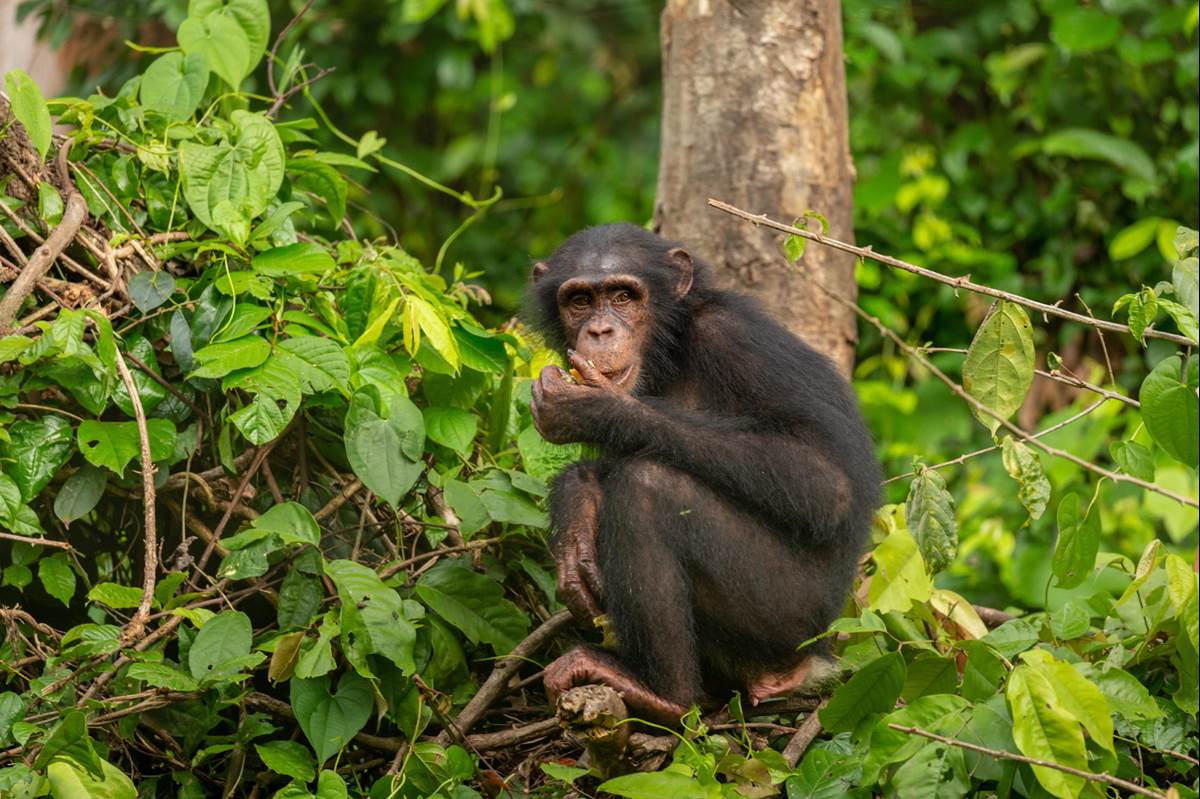Jane Goodall pioneered chimpanzee research and her work is being carried on by “The Next Generation's Champion of Chimps,” the newest episode of Overheard at National Geographic. Host Amy Briggs introduces listeners to Rachel Ashegebofe and Katy Gonder, who have expanded the research beyond Central Africa where subspecies have been discovered in isolated groups. By the end of the episode, it becomes very clear that we’ve come a long way in the 60 years since Goodall started her work, but we still have a long way to go to protect humans’ closest genetic relatives.
Inspired by Jane Goodall’s 1986 book The Chimpanzees of Gombe, Katy Gonder, head of the biology department at Drexel University, began her research in the 1990’s. Goodall’s book stated that Nigeria’s apes were extinct, but she soon learned that the people in Nigeria knew this to be false. On her first research trip, a guide led her to a group of chimpanzees and in studying their DNA, she began to realize that this was actually a subspecies. Unlike the chimpanzees in Central and East Africa, the Nigerian chimps aren’t as vulnerable to the simian version of HIV.
Now known as the Nigeria-Cameroon chimpanzee, the subspecies that Katy discovered is one of just four and is also the rarest. Only a few small pockets of them remain in Western Nigeria and their survival is essential to the health of the forests there, acting as the farmers of the forests. They’re so hard to find that Katy actually spent 6-months without seeing a single chimp before she hired a group of hunters that could help her track them. She finally found a group of chimps near a destroyed marijunana farm, but later worried that hunters now know where they are, so she has no plans to ever go looking for them again.
Speaking of maraijuana farms, they’re illegal and Nigerian chimpanzee researcher Rachel Ashegebofe often encounters them in her work. Drug cartels illegally grow marijuana in protected forests, the home of the Nigeria-Cameroon chimpanzee. She’s usually protected with backup and guns, but during her introduction, we hear about a time she happened upon one while alone in the forest. She made it out alive by convincing them that she’s just a student researching chimpanzees.
Having the GPS coordinates from where she found the farm, Rachel was able to work with a group of ranger trainees she put together to shut down the illegal farm. After rounding up the growers, they also destroy the crops and burn the campsite. It’s important to protect these forests because this subspecies could go extinct in a few years if they lose their habitat. It’s estimated that they will be gone in five years without conservation efforts.
Chimpanzees are so elusive in Ise that Rachel usually studies them by listening and if she’s lucky, she finds fecal droppings that she can collect for analysis. Fun fact, chimpanzee poop has a similar smell to human poop. Rachel believes that the chimpanzees she’s studying are yet another subspecies. If so, her work to protect the forest would become a lot easier. It took 10 years for the Nigeria-Cameroon subspecies to be widely accepted, so this process would need to be streamlined to beat the 5 year extinction prediction.
The biggest threat these chimpanzees face is human population growth, with Nigeria estimated to be the third most populated country by 2050, behind China and India. A growing population increases the need for farms, which usually means deforestation. For that reason, Rachel has been focused on trying to find jobs for hunters and joggers in roles that would protect the forest instead.
You can listen to this full episode and others at the official Overheard at National Geographic website.

